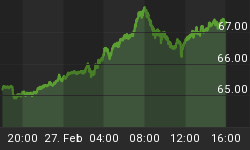As internal debates in the Gulf and Asian nations intensify over the need to continue propping up the U.S. economy, dangerous signals this past week from the Fed, Freddie Mac, and Wall Street may be pushing them to finally let go of the lifelines that have kept America afloat.
Despite clear signs of surging prices in the U.S., the Fed took a major step in undermining its own credibility with its most recent forecast that inflation would remain below 2% for the next three years. As the forecast clearly paved the way for additional Fed rate cuts, Wall Street ignored its absurdity and heralded the announcement as legitimate good news. The celebration is likely infuriating foreign governments, who must be dumbstruck that the Fed can claim contained inflation at home while the declining dollar is fueling massive inflation problems around the world.
In order to maintain their pegs to the dollar, foreign central banks have been forced to print their own currencies to buy all the dollars accumulated by their exporters. This has resulted in upward pressure on consumer prices in their respective nations, with annual increases now reaching alarming rates. Bernanke's message of benign neglect means U.S. exported inflation will likely increase substantially in the years ahead, exacerbating the inflation problems for those nations now supporting the dollar.
In December, OPEC nations will convene to discuss continuing their dollar pegs. If they were looking for a reason to drop them, the Fed may have just provided it.
Also this week, Freddie Mac announced billions in losses and indicated additional capital will be required to avoid insolvency. As shares of both Freddie and Fannie plunged, it must be increasing obvious to all that the mortgage crisis now affects the totality of U.S. mortgage-backed securities, many of which are owned by these very foreign central banks. As bankruptcy for these two quasi-government agencies becomes a serious threat, the implied U.S. government guarantee will certainly be called into question. If the government were to honor it, how many more dollars would be printed, and how much will those dollars be worth? Either way, contemplating the inflationary implications of these bankruptcies will weigh heavily on the minds of foreign central bankers with dollar pegged currencies.
Perhaps the icing on this "let them eat cake" mentality was provided by Wall Street itself. In a year with record losses, Wall Street firms announced that they would also be paying record bonuses to their employees. The rationale for this PR fiasco was that since the losses were not the fault of the employees (really?), they should not be made to suffer. So rather than sharing the pain being endured by their firms' shareholders (clearly even less culpable then themselves), Wall Street's fat cats will rub salt in their owners' wounds by compounding their losses with the additional expense of lavish bonuses. Following the outlandish pay packages already given to ousted CEO's who clearly were responsible for the losses, Wall Street's "heads we win, tails you lose" attitude will not go over well abroad.
In many nations now supporting our currency, the only thing similarly disgraced CEOs would have taken would have been their own lives. If Wall Street firms care so little about their own shareholders, what confidence will customers have that their interests will be respected? Such disgraceful compensation in the wake of such horrendous losses, especially following the lousy advice given to clients to buy these toxic mortgage-backed securities in the first place, proves that the only wallets Wall Street executives watch are their own.
For a more in depth analysis of the tenuous position of the American economy, the housing and mortgage markets, and U.S. dollar denominated investments, read my new book "Crash Proof: How to Profit from the Coming Economic Collapse." Click here to order a copy today.
More importantly, don't wait for reality to set in. Protect your wealth and preserve your purchasing power before it's too late. Discover the best way to buy gold at www.goldyoucanfold.com, download my free research report on the powerful case for investing in foreign equities available at www.researchreportone.com, and subscribe to my free, on-line investment newsletter at http://www.europac.net/newsletter/newsletter.asp.















